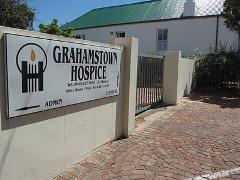Hospice saved my life

 Even though the Grahamstown Hospice looks after people who are literally on their death beds, there are a lucky few who, with the help of modern medicine combined with quality care, actually make it out of the hospice alive. Thirty-one year-old Sthembiso Jokani, who is HIV- positive, is one of the lucky few who were granted a second chance at life after he was admitted at the Grahamstown hospice without any hope that he would recover.
Even though the Grahamstown Hospice looks after people who are literally on their death beds, there are a lucky few who, with the help of modern medicine combined with quality care, actually make it out of the hospice alive. Thirty-one year-old Sthembiso Jokani, who is HIV- positive, is one of the lucky few who were granted a second chance at life after he was admitted at the Grahamstown hospice without any hope that he would recover.
‘I also had cancer. I was unable to walk. My legs were swollen and I had given up all hope’, says Sthembiso.
Before Sthembiso had cancer he had found out that he was HIV-positive when he was only 20 years of age in the year 2000. He was in denial for a couple of years and only looked for medical help when he was seriously ill in 2004.
‘In early January 2000, I went for a HIV test and I found out I was HIV-positive. It took me a whole year before I could accept my HIV status. My family also made life difficult as they were not supportive’, he says.
Sthembiso received help at the Grahamstown Hospice, where he was admitted for palliative care. Palliative care focuses on the physical, spiritual and psycho-social care of patients and improves the quality of life of people with life-threatening illnesses.
‘I was on my death bed. I really believed that I was going to die. The hospice care workers gave me hope and kept on telling me that I would recover’, says Sthembiso.
The Grahamstown hospice helps patients who suffer from HIV & AIDS, cancer, TB and many other life-threatening diseases.
‘We help the patients and their families so that the family members may be able to take better care of their loved one’, says Ndumiso Mateyisi a counsellor at the Grahamstown hospice.
Ndumiso says most of their patients with terminal cancer, inevitably die. He says they offer patients not only medical help, but also psychological services, to help patients accept their deadly fate.
‘Death is not something that one can get used to. It is always sad to see a patient die, even though you knew it would happen sooner or later’, he says.
But some patients do get out of hospice alive. The advent of antiretrovirals has helped ensure that many people’s lives are prolonged. With the help of these medications, Sthembiso’s life was spared.
‘HIV-positive patients tend to recover when they receive the right medication at the right time’, says Ndumiso.
But Sthembiso was lucky to even get help. His destitute family abandoned him after he told them he had HIV. He then turned to his church where fellow congregant, Nokwandisi Jafta, decided to take him into her house and, then, ultimately to the Grahamstown hospice.
‘When he told me that he was HIV-positive, I told him to be strong and that I was there for him. He comes from a very poor family’¦ so I asked him to stay with me, instead’, says Nokwandisi Jafta.
Nokwandisi says she had no fear looking after Sthembiso. But what really pains her is the stigma that people with HIV and AIDS face.
‘People should not treat HIV-positive people like animals. They are humans just like the rest of us. Everyone is HIV-positive until they go for a test to prove otherwise’, she says.
Happy to be alive, Sthembiso says he is grateful to the Grahamstown Hospice for their help.
‘It’s a miracle that I am still alive. So many other patients passed away. I would like to thank the hospice for their help’, says Sthembiso.
Author
Republish this article
This work is licensed under a Creative Commons Attribution-NoDerivatives 4.0 International License.
Unless otherwise noted, you can republish our articles for free under a Creative Commons license. Here’s what you need to know:
You have to credit Health-e News. In the byline, we prefer “Author Name, Publication.” At the top of the text of your story, include a line that reads: “This story was originally published by Health-e News.” You must link the word “Health-e News” to the original URL of the story.
You must include all of the links from our story, including our newsletter sign up link.
If you use canonical metadata, please use the Health-e News URL. For more information about canonical metadata, click here.
You can’t edit our material, except to reflect relative changes in time, location and editorial style. (For example, “yesterday” can be changed to “last week”)
You have no rights to sell, license, syndicate, or otherwise represent yourself as the authorized owner of our material to any third parties. This means that you cannot actively publish or submit our work for syndication to third party platforms or apps like Apple News or Google News. Health-e News understands that publishers cannot fully control when certain third parties automatically summarise or crawl content from publishers’ own sites.
You can’t republish our material wholesale, or automatically; you need to select stories to be republished individually.
If you share republished stories on social media, we’d appreciate being tagged in your posts. You can find us on Twitter @HealthENews, Instagram @healthenews, and Facebook Health-e News Service.
You can grab HTML code for our stories easily. Click on the Creative Commons logo on our stories. You’ll find it with the other share buttons.
If you have any other questions, contact info@health-e.org.za.
Hospice saved my life
by siphosethustuurman, Health-e News
July 11, 2011



